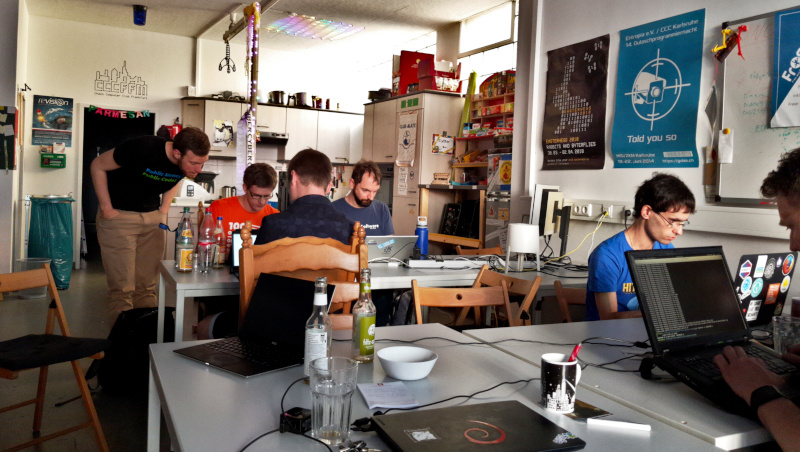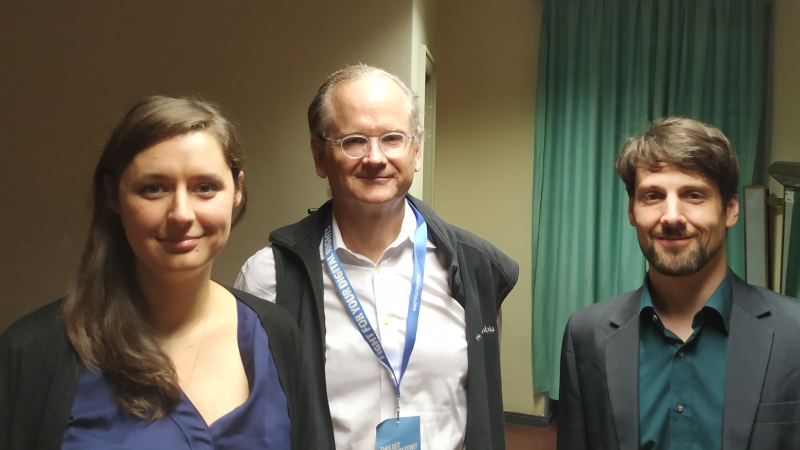Public Hackathons +++ Munich supports Public Code +++ New Podcasts
mardi 12 mai 2020 à 01:00Public Hackathons +++ Munich supports Public Code +++ New Podcasts
Read about our demand to publish the results of publicly financed hackathons as Free Software, about a new coalition-agreement in Munich that aligns with our principles of "Public Money? Public Code!" and what happened inside the FSFE and our community. You will also read about the results of our web-sprint, about our regular podcast and an extraordinary one.
COVID-19 Hackathons: Only Free Software creates global solutions
In recent weeks we have seen many hackathons that have been organised to tackle the COVID-19 pandemic. Interestingly, many of them have been organised by governments and other public bodies who are hosting or funding these hackathons. As with our "Public Money? Public Code!" campaign, at the FSFE we demand that software resulting from publicly funded hackathons can be re-used globally by publishing it under a Free Software license.
Especially in a time when humanity needs to work together to find solutions for a crisis, we cannot afford to reinvent the wheel again and again for software that helps us contain the spread of COVID-19. Global problems need global solutions! It is Free Software that enables global cooperation for code development. Any proprietary solution will inevitably lead to countless isolated solutions and will waste energy and time which we as humanity cannot afford in such a critical situation.
 At the FSFE's hack-a-thons, everything we code is free.
At the FSFE's hack-a-thons, everything we code is free.
Munich commits to "Public Money? Public Code!"
Just a few years ago, a Munich government formed by SPD (social democrats) and CSU (conservatives) decided to abandon the local administration's migration to Free Software under the project name "LiMux". Since the election in March a new government has been in place and the coalition agreement between SPD and Greens in Munich includes a positive statement on the use of Free Software: the principle "Public Money? Public Code!" should apply in future.
While we welcome that the City of Munich seems to have come back on track, the agreement leaves room for improvement as it includes some typical loopholes such as the vague limitation to software whose code does not contain personal or confidential data. The FSFE will continue to closely monitor the progress of the implementation of the "Public Money, Public Code!" policy and how procurement procedures will be handled in the future.
Governments publish Corona tracing apps under a Free Software licence
In early March the FSFE published its demand that the use of any tracking technology to break the chains of disease infection may only be promoted on a voluntary basis, with fundamental rights respected, and that the software be published under a Free Software license. As a reaction to this, EU member states, supported by the European Commission, released a "Common EU Toolbox for Member States" including "Recommendations for a common approach to mobile tracing apps" asking to "openly publish the technical specifications and the source code for the apps, as a way to maximise re-use, interoperability, auditability and security".
Now more and more governments, like Germany, Austria or the Netherlands, follow the FSFE's demands and stipulate to publish the code of Corona tracing apps under a Free Software license. Still, we will closely monitor the process and want to achieve that the whole development process happen transparently as we know it from Free Software - and not to publish the code only after its development.
The biggest financial impact the FSFE faces in these times of physical distancing is the cancellation of Free Software conferences, including our own events. To keep the software freedom movement solid and alive, please consider donating a part of your conference budget to Free Software organisations, including the FSFE.
Upcoming events
- On 16-17 May will be the online event Özgürkon during which Alexander Sander will present recent developments in our "Public Money? Public Code!" campaign. The FSFE is a partner organisation of the event.
- On 17.-18 June will be OW2online20 during which our legal coordinator Gabriel Ku Wei Bin will speak about REUSE and the NGI project.
What have we done? Inside and outside the FSFE
- We have a new episode of our regular Software Freedom Podcast, this time with Professor Lawrence Lessig, founder and present board member of Creative Commons. Together we discuss the different types of regulation that affect society both online and offline, such as laws, norms, the market, or architecture.
- We also published a special episode of the Software Freedom Podcast in which we talk about some of the advantages of GNU Health and how it can and already does help with the current COVID-19 pandemic. Our guests are Dr. Luis Falcón who is the author of GNU Health and Dr. Axel Braun who published the first live CD of GNU Health.
- The FSFE has joined the Advisory Board of NGI Pointer, one of the projects within the European Commission's Next Generation Internet (“NGI”) initiative. Within this role, the FSFE will provide license compliance support to successful applicants. The first call for applications to join NGI Pointer is now open until 1 June 2020.
- The FSFE co-organised the online event "Forum Bits&Bäume" with the topic "Sustainable Soft- and Hardware". Erik Albers gave a session about the role of Free Software regarding sustainability of software.
- We ran a "little web sprint" to improve some major things regarding our website. Among the visible things are the relaunch of our front page and the our team site. Many other major improvements have been happening in the background and are only "visible" in our issue tracker.
- Matthias Kirschner and Max Mehl have been covered in two episodes of the Librezoom podcast which is done by the FSFE's local group in Zürich. Max Mehl talks about security and privacy and Matthias Kirschner about "cloud" and Free Software. Both episodes are in German.
 Katharina Nocun, Lawrence Lessig and Matthias Kirschner while recording the Software Freedom Podcast.
Katharina Nocun, Lawrence Lessig and Matthias Kirschner while recording the Software Freedom Podcast.
Netherlands commits to Free Software by default
In an open letter to the Parliament, the Dutch minister for internal affairs, Raymond Knops, commits to a "Free Software by default" policy and underlines its benefits for society. A rewording of current market regulations shall be proposed to allow publishing of Free Software by the government.
Stories from the FSFE Planet
- Hannes Hauswedell writes about Game-streaming without the "cloud": how to stream a native Windows game, "Divinity Original Sin 2", installed DRM-free from GOG, via Steam Remote Play from his Desktop running Devuan GNU/Linux in 4K resolution and maximum quality directly to his TV running Android.
- Dmaphy writes about a new update for the terminal emulator Terminator 1.92, now supporting Python 3.
Get Active: Convince hackathons to create global solutions
We are still looking for hackathons that are organised by public entitites and trying to convince them to publish their software under a Free Software license. If you know such a hackathon, then help us to gather more of them on our dedicated wiki page.
Please ask for others to help you or directly get in contact with the organisers yourself to make them aware that the results of these hackathons should be made ready to be used globally and adapted locally - which is only possible if the software can be used, studied, shared and improved. You can find help for your communication on the very same wiki page.
Contribute to our newsletter
If you would like to share any thoughts, pictures, or news, send them to us. As always, the address is newsletter@fsfe.org. We're looking forward to hearing from you!
If you also want to support us and our work, join our community and support us with a donation or a monthly contribution.
Thanks to our community, all the volunteers, supporters and donors who make our work possible. And thanks to our translators, who enable you to read this newsletter in your native languages.
Stay safe,
Erik Albers

 NGI Architects will change the underlying fabric of the Internet
NGI Architects will change the underlying fabric of the Internet